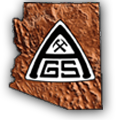
Harold Courtright had a life-long interest and career in mining and geology in the Cordillera of North and South America. His field mapping skills and exploration expertise led to the discovery of well-known porphyry copper deposits in Arizona and Peru. The scholarship fund, set up after his death in 1986, is designed to promote graduate research in the Cordillera and, while the Society may support exciting studies in any geologic discipline, we do place special emphasis on field geology, economic geology, and the study of ore deposits.
For more details about this scholarship visit our Student Outreach Page.

Erin Alexander
Arizona State University
2025 Courtright Scholarship Recipient
Erin Alexander wrote a clear and concise application describing a multidisciplinary research project focused on characterizing structural controls on the plumbing systems of modern hot springs in Yellowstone National Park. The project describes an elegant natural experiment where three different focus areas, each with different structural and geochemical parameters, will provide natural controls to assess structural influence on wallrock alteration and hot spring geochemistry. This work may serve as an analogue to understand the plumbing of surficial hydrothermal systems to ancient epithermal ore deposits.

Pedro Henrique Sarge Brito
University of Arizona
2025 Courtright Scholarship Recipient
Pedro Henrique Sarge Brito wrote a strong application succinctly describing a pertinent research project with clearly outlined motivations, goals, and methods. Pedro’s work will focus on hypogene mineralization within the Morenci porphyry system, which is understudied compared to the extensively characterized and mined supergene mineralization. His project will entail: 1) mapping the distribution and zonation of major alteration assemblages (potassic, phyllic, argillic, propylitic) along the hypogene section of the mine, (2) establishment of a vein paragenesis which differentiates between different stages of hypogene mineralization, and (3) integration of mineralogical and geochemical data to establish the evolution of the mineral system.



